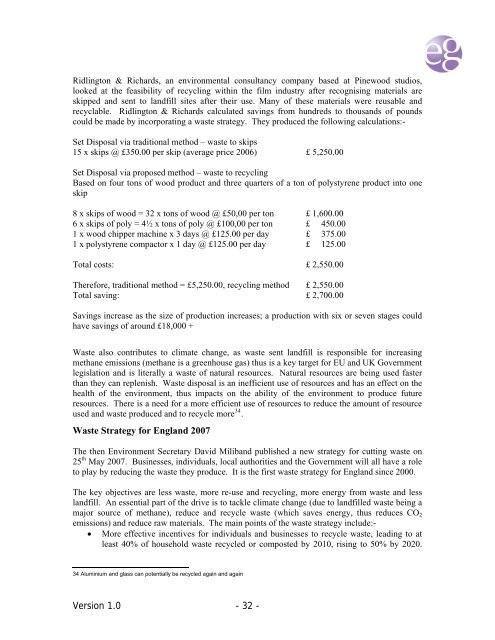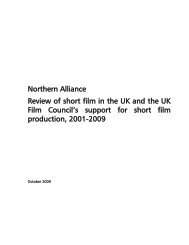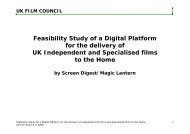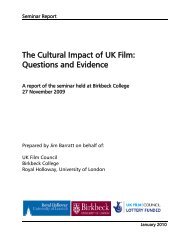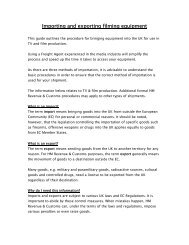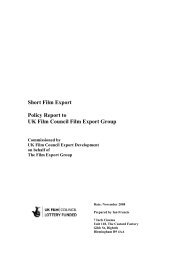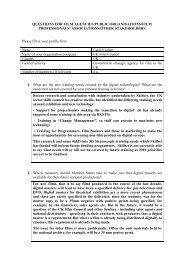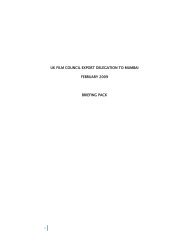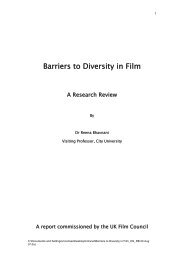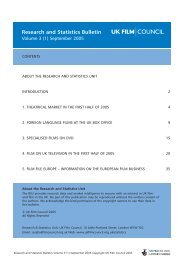Developing an environmental strategy for UK film - BFI
Developing an environmental strategy for UK film - BFI
Developing an environmental strategy for UK film - BFI
You also want an ePaper? Increase the reach of your titles
YUMPU automatically turns print PDFs into web optimized ePapers that Google loves.
Ridlington & Richards, <strong>an</strong> <strong>environmental</strong> consult<strong>an</strong>cy comp<strong>an</strong>y based at Pinewood studios,<br />
looked at the feasibility of recycling within the <strong>film</strong> industry after recognising materials are<br />
skipped <strong>an</strong>d sent to l<strong>an</strong>dfill sites after their use. M<strong>an</strong>y of these materials were reusable <strong>an</strong>d<br />
recyclable. Ridlington & Richards calculated savings from hundreds to thous<strong>an</strong>ds of pounds<br />
could be made by incorporating a waste <strong>strategy</strong>. They produced the following calculations:-<br />
Set Disposal via traditional method – waste to skips<br />
15 x skips @ £350.00 per skip (average price 2006) £ 5,250.00<br />
Set Disposal via proposed method – waste to recycling<br />
Based on four tons of wood product <strong>an</strong>d three quarters of a ton of polystyrene product into one<br />
skip<br />
8 x skips of wood = 32 x tons of wood @ £50,00 per ton £ 1,600.00<br />
6 x skips of poly = 4½ x tons of poly @ £100,00 per ton £ 450.00<br />
1 x wood chipper machine x 3 days @ £125.00 per day £ 375.00<br />
1 x polystyrene compactor x 1 day @ £125.00 per day £ 125.00<br />
Total costs: £ 2,550.00<br />
There<strong>for</strong>e, traditional method = £5,250.00, recycling method £ 2,550.00<br />
Total saving: £ 2,700.00<br />
Savings increase as the size of production increases; a production with six or seven stages could<br />
have savings of around £18,000 +<br />
Waste also contributes to climate ch<strong>an</strong>ge, as waste sent l<strong>an</strong>dfill is responsible <strong>for</strong> increasing<br />
meth<strong>an</strong>e emissions (meth<strong>an</strong>e is a greenhouse gas) thus is a key target <strong>for</strong> EU <strong>an</strong>d <strong>UK</strong> Government<br />
legislation <strong>an</strong>d is literally a waste of natural resources. Natural resources are being used faster<br />
th<strong>an</strong> they c<strong>an</strong> replenish. Waste disposal is <strong>an</strong> inefficient use of resources <strong>an</strong>d has <strong>an</strong> effect on the<br />
health of the environment, thus impacts on the ability of the environment to produce future<br />
resources. There is a need <strong>for</strong> a more efficient use of resources to reduce the amount of resource<br />
used <strong>an</strong>d waste produced <strong>an</strong>d to recycle more 34 .<br />
Waste Strategy <strong>for</strong> Engl<strong>an</strong>d 2007<br />
The then Environment Secretary David Milib<strong>an</strong>d published a new <strong>strategy</strong> <strong>for</strong> cutting waste on<br />
25 th May 2007. Businesses, individuals, local authorities <strong>an</strong>d the Government will all have a role<br />
to play by reducing the waste they produce. It is the first waste <strong>strategy</strong> <strong>for</strong> Engl<strong>an</strong>d since 2000.<br />
The key objectives are less waste, more re-use <strong>an</strong>d recycling, more energy from waste <strong>an</strong>d less<br />
l<strong>an</strong>dfill. An essential part of the drive is to tackle climate ch<strong>an</strong>ge (due to l<strong>an</strong>dfilled waste being a<br />
major source of meth<strong>an</strong>e), reduce <strong>an</strong>d recycle waste (which saves energy, thus reduces CO2<br />
emissions) <strong>an</strong>d reduce raw materials. The main points of the waste <strong>strategy</strong> include:-<br />
• More effective incentives <strong>for</strong> individuals <strong>an</strong>d businesses to recycle waste, leading to at<br />
least 40% of household waste recycled or composted by 2010, rising to 50% by 2020.<br />
34 Aluminium <strong>an</strong>d glass c<strong>an</strong> potentially be recycled again <strong>an</strong>d again<br />
Version 1.0 - 32 -


